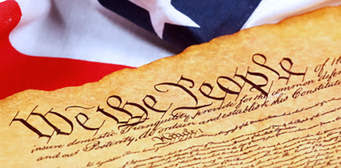Left-wing
activists love to demonize America's founding documents as
"racist." However, a careful look at the documents in their
historical context reveal a very different story. An honest examination of the
documents and their early history reveal that they were written as anti-slavery
documents. Such stalwarts as Frederick Douglass and Dr. Martin Luther king, Jr. understood this, as documented below.
Their Anti-Slavery Character
America’s founding documents contain no classifications based on race, ethnicity, or skin color. The words “slave” and “slavery” are nowhere to be found. Instead, the framers of the Constitution use the words “persons,” “citizens,” and “other persons.” James Madison said the language was a purposeful statement against slavery (Hyatt, 1726: The Year that Defined America, 123).
The
Declaration of Independence declares that “all men are created equal and are
endowed by their Creator with certain unalienable rights . . ..” This was
considered an anti-slavery statement by America’s founding generation and
abolitionists used it in their fight against slavery.
For
example, a 1784 gathering of Methodist leaders in Baltimore published a
statement denouncing slavery and based their condemnation on both the Bible and
the Declaration of Independence. They denounced slavery as, “contrary to the
golden rule of God . . . as well as every principle of the [American]
Revolution” (Hyatt, Abolitionist Founding Fathers, 29).
Samuel Hopkins, a pastor in Newport, RI
and a passionate abolitionist, also used the Declaration of Independence in his
arguments against slavery. He was incensed at some who said that slavery was
God’s way of exposing Africans to the gospel. He thundered,
What
sort of “gospel” message is being conveyed when people are enslaved because of
the color of their skin? The Declaration of Independence says all men are
created equal with certain unalienable rights. Oh, the shocking, the
intolerable inconsistencies (Hyatt, Abolitionist
Founding Fathers, 29).
America’s Founders Turn Against Slavery
These
colorblind founding documents were the fruit of a powerful abolition movement
that emerged out of the First Great Awakening (1726-70). So influential was
this movement that virtually every founder, even those who owned slaves, took a
public stand against it.
For
example, in a letter to Robert Morris, dated April
12, 1786, George Washington said, “There is not a man living who wishes more sincerely than I do, to see a plan
adopted for the abolition of slavery.” Virtually every founder came to agree
with John Adams who wrote,
Every
measure of prudence ought to be assumed for the eventual total extirpation of
slavery from the United States . . . I have throughout my whole life held the
practice of slavery in abhorrence (Hyatt, 1726: The Year that Defined
America, 101).
This
movement against slavery occurred at a time when slavery was accepted and practiced
throughout most of the world. Dr. Thomas Sowell has written of this saying,
Among those who turned
against slavery in the 18th century were George Washington, Thomas
Jefferson, Patrick Henry and other America leaders. You could research all of
18th century Africa, or
Asia, or the Middle East without finding any comparable rejection of slavery
there (Hyatt, 1726: The Year that Defined America, 90).
Frederick Douglass and Dr. King
In
his early years, the famous abolitionist and former slave, Frederick Douglass,
felt he had no part in America because of slavery. But after studying America’s
founding and realizing that America’s founders were on the cutting edge of the
fight against slavery, he came to a completely different view. In a July
4th speech delivered in 1852, Douglass called the U.S, Constitution “a
glorious liberty document” and extoled America’s founders, saying,
Fellow Citizens, I am
not wanting in respect for the fathers of this republic. The signers of the
Declaration of Independence were brave men. They were great men too—great
enough to give fame to a great age. It does not often happen to a nation to
raise, at one time, such a number of truly great men.
Obviously convinced of the anti-slavery character of the founding documents, Douglass also said, “Any one of these provisions in the hands of abolition statesmen, and backed by a right moral sentiment, would put an end to slavery in America.” (Hyatt, 1726: The Year that Defined America, 121).
Dr. Martin Luther
King, Jr. utilized America’s founding documents in his fight for racial
equality. He saw the problem to be, not with the founding documents, but with succeeding
generations not living up to the truths in those documents. In his famous “I
Have a Dream” speech, he declared,
When the architects of our Republic wrote the magnificent words of the
Constitution and the Declaration of Independence, they were signing a promissory note
to which every American was to fall heir. This note was a promise that all men,
yes, Black men as well as White men, would be guaranteed the "unalienable
Rights" of "Life, Liberty and the pursuit of Happiness."
Then alluding to the Declaration of Independence, he proclaimed, “I have a dream that one day this nation will rise up and live out the true meaning of its creed: "We hold these truths to be self-evident, that all men are created equal.”
The Way Forward from Here
We must proclaim
this truth in the face of the anti-American forces that are demonizing the founders
and our founding documents. Douglass would agree, for in the same speech noted
above, he referred to the Declaration of Independence and then exhorted his
audience,
The
principles contained in that instrument are saving principles. Stand by those
principles, be true to them on all occasions, in all places, against all foes,
and at whatever cost.
This article is derived from Dr. Eddie
Hyatt’s books, 1726: TheYear that Defined America and Abolitionist Founding Fathers available from Amazon and his website at http://eddiehyatt.com.


No comments:
Post a Comment